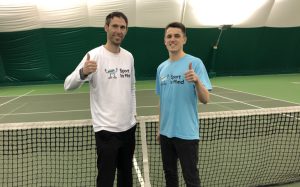From tackling mental ill health through sport, to tutoring school pupils, CONNECTED looks at how the University of Reading community is helping others during lockdown.
The University of Reading community has stepped up to support people in a myriad of ways since the pandemic struck. CONNECTED takes a look at two examples, from how our staff and students are helping to tackle mental ill health, to how our students are tutoring pupils missing out on classes while they cannot attend school.
Improving mental health through sport
Nathan Bingham – usually found in our Marketing and Campaigns team – has been volunteering with mental health charity Sport in Mind in his spare time, to improve the  lives of people experiencing mental health problems through sport and physical activity. Nathan speaks to CONNECTED about the charity’s latest campaign #DontDropTheBall.
lives of people experiencing mental health problems through sport and physical activity. Nathan speaks to CONNECTED about the charity’s latest campaign #DontDropTheBall.
Nathan said: “Since going into lockdown Sport in Mind has been unable to run its usual range of in-person sessions. As an alternative they have been keeping its community active through online sessions and creative challenges.
“Their latest campaign encourages people to keep their mental health in check with the slogan ‘don’t drop the ball on mental health’. In these challenging times it’s more important than ever for people to look after their mental wellbeing.”
The Reading-based charity which operates across the South East and Dorset, is asking people to record themselves completing 10 keepy-ups (or however many you can) with any ball and sports equipment you have at your disposal – and you don’t have to use your feet! They are aiming to complete 6507 keepy-ups – a number that represents all the people lost to suicide in the country in 2018.
Then post your video on social media @sportinmind with the hashtag #DontDropTheBall and nominate some friends to complete the challenge too.
Nathan said: “I’m a big believer in the importance of being active and the benefits that come with being part of a community or team. It provides purpose, routine and a place to switch off.
“A great example of this is how, during lockdown, the Marketing and Campaigns team at the University have been getting together for short virtual exercise classes each morning, which have been a great way to start the day positively.
“Sport in Mind arrange free, fully-supported sessions to those who may be struggling, offering a relaxed environment to do something that you love and take that important time for yourself. As a volunteer for Sport in Mind I’ve been helping raise awareness of the charity in the Reading area, and last year organised a football match through my local team Woodley United Sunday where we raised £1500.”
Sport in Mind’s founder Neil Harris, said: “The COVID-19 pandemic has had a huge impact on everyone’s lives and Sport in Mind believe it is vitally important that everyone looks after their mental health in these uncertain times.
“Feeling connected and engaging in physical activity is proven to support mental wellbeing and we want to encourage people to stay active to look after their own mental health and join our latest campaign #DontDropTheBall to promote this message.”
 University of Reading psychology students Leyla Owen and Mark Jeavons are also supporters of Sport in Mind, and before lockdown were helping their fellow classmates improve their mental health through sport. They set up the Sport in Mind student society after doing some voluntary work with the charity.
University of Reading psychology students Leyla Owen and Mark Jeavons are also supporters of Sport in Mind, and before lockdown were helping their fellow classmates improve their mental health through sport. They set up the Sport in Mind student society after doing some voluntary work with the charity.
Leyla Owen, co-President of Sport in Mind Voluntary Society at Reading University, said:
“I know many students who have suffered with mental health issues during their time at university, including myself, and wanted to offer them a way to improve their wellbeing through sport. Our numbers are steadily rising, demonstrating the benefits students are seeing through engaging in physical activity.”
The society’s sessions are free of charge at the University SportsPark, but while physical activities have been unable to run during lockdown, the society has been encouraging students via social media to engage with #DontDropTheBall.
Leaving no pupil behind
While our community is doing a fantastic job of tackling mental ill health through sport, Domenica Taverna, a first year Classics student, speaks to CONNECTED about how she has been putting her skills to good use during lockdown by tutoring younger students.
The Coronavirus Tutoring Initiative (CTI) scheme, which was set up by three students from the University of Oxford – Sam, Jacob and Niccolo – matches University students with young people who are studying for their SATs, GCSEs and A-Levels but who might be missing out on key learning while their schools are closed.
 The free initiative, which launched in March, screens all prospective tutors before remotely pairing them with a student to teach a subject of their choice.
The free initiative, which launched in March, screens all prospective tutors before remotely pairing them with a student to teach a subject of their choice.
Domenica said: “The scheme really resonated with me as a way to give all students a chance, regardless of factors such as income, to get really specialised one-to-one tutoring, at a casual but in-depth level.
“The sessions are very relaxed and I structure mine as more of a guided conversation to keep a chilled atmosphere without adding any extra stress onto the students, while also keeping that academic element present in their life.
“I am currently tutoring an A-Level student in religious studies and philosophy, but tutors can take on as many students as they can cope with. Collectively since the start of May, more than 1,000 hours of tutoring have been delivered. The founders have done an amazing job putting it all together – it’s very intricate and well thought-out.”
A spokesperson for the CTI said:
“The Coronavirus pandemic is a very difficult and testing time, which is why we have set up CTI to help support students, schools and parents.
“We strongly believe that no student should be left behind because of circumstances outside of their control and we aim to level out the playing field to the best of our ability, which is why the initiative is aimed at children of key workers and those who cannot afford a private tutor.”
Domenica is currently shielding alone in her halls of residence and says that the tutoring has added structure and purpose to her days. Despite having had no physical contact with anyone during lockdown, Domenica says she is coping well:
“I have a really strong support network around me, which I am incredibly grateful for.
“I’d really like to say thank you to my academic tutor, Professor Katherine Harloe for being the kindest and greatest support, even while working from home and on research leave. Also, Professor Carol Fuller from the Institute of Education, and Pablo Ferrer Beltran from Park Post who have consistently and selflessly gone above and beyond to help me out whilst I am shielding; I am so grateful for them all.”
Discover more about how the University of Reading community has been helping out during the pandemic.






